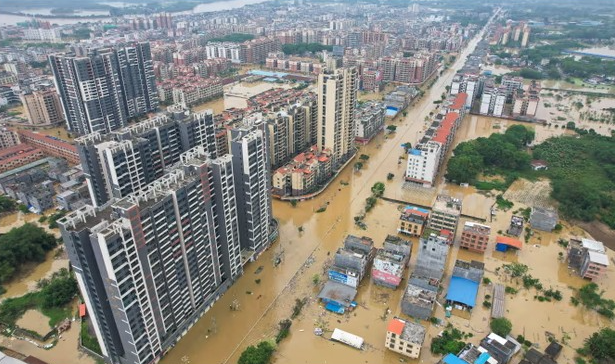'Once-in-a-century' floods in China, threaten tens of millions as horrifying videos surface
Total Views |
Beijing, April 23: China evacuated 110,000 people from their homes in Guangdong, as days of heavy rain caused massive flooding in China's most populous province. Four people have died so far, while 10 have gone missing, according to state media.

Authorities had warned that the level of a river in northern Guangdong could hit a "once in 100 years" peak on Monday morning, though this had yet to materialise by noon.
Much of Guangdong is part of the low-lying Pearl River delta, which is prone to floods due to the rise in sea levels and storm surges. The delta is a major manufacturing base in China and one of the country’s most densely-populated regions, with Guangdong alone home to around 127 million people.
❗️4 dead in cataclysmic #China floods
— 𝐂𝐡𝐞 𝐆𝐮𝐞𝐯𝐚𝐫𝐚 ☭ (@cheguwera) April 22, 2024
Authorities in Guangdong Province said that another 10 people remain missing amidst the record-breaking rainfall that has wreaked havoc over the weekend.
Although it is the traditional rain season in the region, rainfall has been up to… pic.twitter.com/GLdKooBbW7
The megacity of Shenzhen was specifically highlighted as facing "heavy to very heavy downpours," as stated by the city's meteorological observatory. They further cautioned of a "very high" risk of flash floods in the affected areas.
While China has faced various extreme weather events in the past, including severe floods, prolonged droughts, and record-breaking heatwaves, the impact of climate change has exacerbated these occurrences.
Heavy rains in northern Guangdong caused severe flooding, and the Beijiang Basin experienced the second largest flood in 100 years! pic.twitter.com/5aURyWCWcM
— Jim (@yangyubin1998) April 23, 2024
Human-induced greenhouse gas emissions, primarily responsible for climate change, have intensified the frequency and severity of extreme weather events worldwide. Notably, China, as the largest emitter of greenhouse gases globally, plays a significant role in driving this phenomenon.

